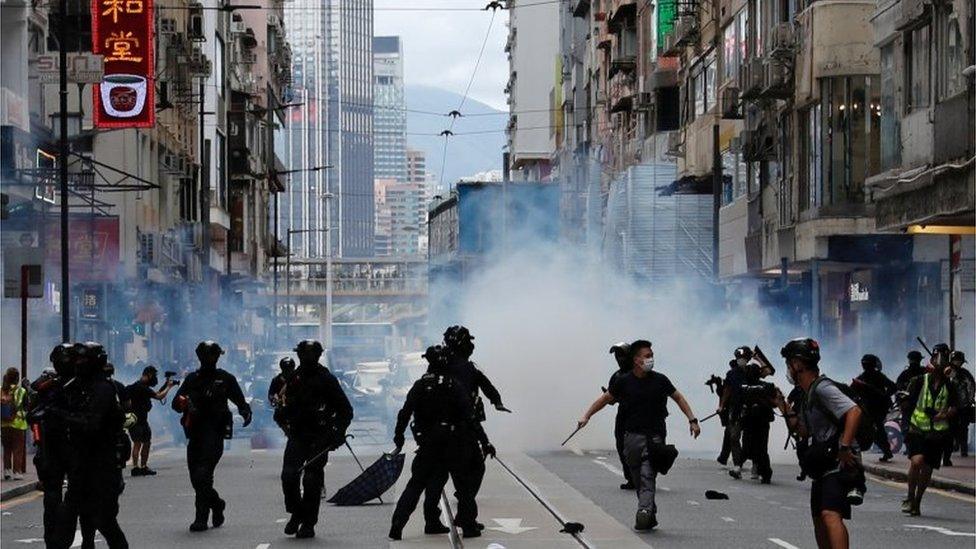Hong Kong migrants to UK will need support, ministers told
- Published

Protests to defend Hong Kong's autonomy from Beijing have a reputation for violence
Migrants from Hong Kong to the UK say they have concerns about housing, jobs and Chinese state surveillance once they start to arrive from next year.
The claims have been made by a new migrants' group ahead of the introduction of a new Hong Kong visa.
From 31 January, Hong Kong residents can come to the UK for up to five years and apply for permanent residency.
Britain says Beijing's imposition of a national security law on the region is an erosion of freedoms and rights.
The group Hong Kongers in Britain (HKB) says migrants expect to experience difficulties finding housing and jobs.
And some have raised concerns they might be tracked by "informants or secret agents" from China.
HKB is urging the Home Office to show discretion to people who may have criminal records in Hong Kong as a result of taking part in pro-democracy protests.
But the organisation expects the new population to integrate well, including with the UK's existing Chinese communities.
At the last census in 2011 there were around 400,000 Chinese people living in England and Wales.
HKB said most migrants would be well-educated, higher-earners who speak good English.
Spokeswoman Dr Rikkie Yeung said: "Hong Kongers who are trying to leave Hong Kong out of concern for safety and freedoms share similar values with the British people.
"I hope that people can integrate easily into this country."
'Helping hands'
The Home Office says at least 154,000 Hong Kong people could arrive on the British National (Overseas) visa in the first year, with between 258,000 and 322,000 arriving in Britain before 2026.
This represents about 22% of total UK immigration in the year to March 2020, before the pandemic took hold.
But HKB says its own research suggests more than 500,000 eligible people could apply for the visa during 2021, with at least 330,000 people and their dependants moving to the UK in the first year.
Its figures are based on the views of 315 Hong Kong people who chose to complete a questionnaire.
HKB's report said the vast majority of respondents were planning to come in the first two years of the visa scheme.
Simon Cheng, who chairs HKB, is a former UK consulate worker in Hong Kong and last year told BBC News he had been detained and beaten in mainland China.
Mr Cheng told BBC News: "We are ready to extend our helping hands, to bring together a meaningful Hong Kongers' community, make Hong Kongers feel at home in the UK, work together to retain common identities and values, empower Hong Kongers to continue to fight for their beliefs and goals, and bring out their best of the Hong Kong spirit to the British society and beyond."